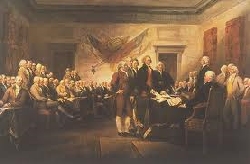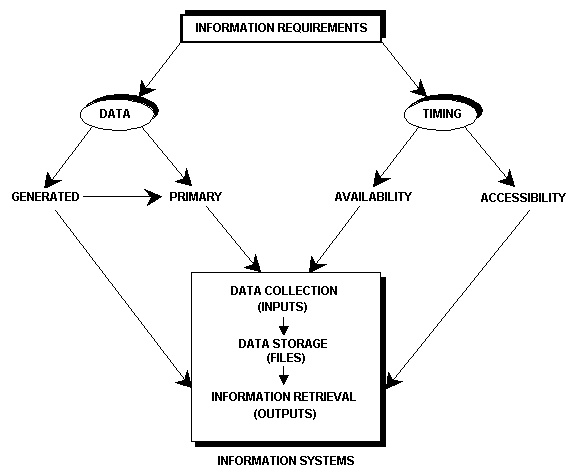BRYCE ON SYSTEMS
- a return to basics in system design.
(Click for
AUDIO VERSION)
To use this segment in a Radio broadcast or Podcast, send TIM a request.
PREFACE: A few months ago I made a promise to some of my techie friends I would describe the concept of "Information Driven Design" as used in our "PRIDE" Methodology for system design. This concept originated in the original version of our product in 1971 and was successfully used by our customers to build enterprise-wide systems. The reason I bring this up is that it appears to me people still have trouble defining information requirements and, as such, they are at a loss as to how to build total systems. Thereby, they are content building either a single business process or a program. Therefore, here is the conceptual foundation for all system design...
Information Driven Design begins with a simple concept:
INFORMATION = DATA + PROCESSING
Information is the intelligence gained from the processing and/or analysis of data. This means information is a product based on two variables, data and processing. We do not store information, we produce it based on these variables. Whereas data represents "what" is to be processed, processing (or systems) represents "how" it is to be processed, using formulas, algorithms or calculations. An invalid calculation is just as misleading as invalid data; both will produce erroneous information. From this perspective, both data and processing must be carefully designed and controlled as resources for producing information, and as resources, they can be shared and reused to produce information for other uses. In this way they should be identified and controlled like any other resource, hence the need for "Information Resource Management," a concept very much akin to "Materials Resource Planning" as found in manufacturing.
Since the intent of an information system is to produce information, the more we understand about information requirements, the better we can accommodate its implementation. This is why we refer to this concept as "Information Driven Design," a system design derived from the inherent properties of information.
INFORMATION DRIVEN DESIGN CONCEPT
Information requirements should be defined in such a way as to explain the Business Functions they serve, their Business Purpose, the Actions and/or Business Decisions they support, and the benefits derived from the use of the information. In this way, it a textual justification for the information. Now let's take it further...
There are three types of information:
Policy Information - To implement executive decisions.
Control Information - To monitor policy and manage operations.
Operational Information - To implement the routine day-to-day activities of the business.
Information is a dynamic and perishable commodity. It only has value at the time it is required. Whereas the definition of data is constant, information requirements can change for a variety of reasons, such as politics, government, competition, economics, people, etc. Ultimately, corporate survival depends on providing users with accurate and timely information.
TIMING
In order to properly specify information requirements, it is not sufficient to merely determine what data is required to support it; it is also necessary to define the timing of the information (to support the actions and/or decisions). This timing will ultimately dictate how data will be collected, stored, and retrieved to produce information.
Failure to recognize timing as an important element of design will result in the data base being out of synchronization with the system. For example, consider a situation where data is collected on a routine weekly basis (just once a week). Daily analysis of the data will be inappropriate since the data will remain constant until the next weekly update. To resolve the conflict, data collection should be changed to at least a daily basis.
All information systems operate in time frames, such as instantaneous, daily, weekly, monthly, quarterly, annually, etc. If this is true, why not make use of this timing consideration during system design as opposed to discovering it afterwards while trying to correct the data base design?
There are three aspects to timing: frequency, offset and response time.
FREQUENCY defines "how often" the information is required, e.g., upon request, hourly, four times daily, once a week, twice monthly, quarterly, semi-annually, etc.
OFFSET defines when processing should begin, such as the beginning of the week, end of the month, etc. However, if the frequency is 'upon request,' then there is no scheduled offset; this is because the information can be requested at any point in time.
RESPONSE TIME defines how fast the information must be delivered to the user. For example, five seconds, two hours, one day, etc. This should not be confused with computer 'response time' or 'throughput' which is concerned with machine speed. Rather, response time is concerned with the maximum amount of time that will transpire between the request and delivery of the information, so the user can make the necessary decisions and/or take action. This implies that if the response time is exceeded, it is no longer information, only historical data.
Timing ultimately defines data availability and accessibility issues. Availability specifies, "Is the data there when I need it?" (a function of Input/Data Collection). And Accessibility specifies, "Can I get to the data when I need it?" (a function of Output/Information Retrieval). Understand this, you cannot access data (retrieve information) if it has not been made available (collected) in a timely manner.
DATA
Data comes in two forms, Primary and Generated. Primary data is what is collected and inputted into the system. Generated data represents calculations derived from primary values. To illustrate, suppose we need the generated data element, "Net Pay," as used in payroll. It would be necessary to define all of the other data dependencies, e.g.;
NET PAY = GROSS PAY - FICA - CITY TAX - UNION DUES - (ETC.)
Other data elements used in the formula may also be generated, such as:
GROSS PAY = HOURS WORKED X PAY RATE
What this means is that in order to arrive at the correct value for "Net Pay," we must be able to reach all of the primary values, such as "Hours Worked" and "Pay Rate," in a timely manner. If we cannot do this, "Net Pay" will be incorrect.
Defining these data dependencies has typically defaulted to the programmer who redefines the relationships with each application and buries it in the program source code, making maintenance and change considerably difficult. Consequently, It is not unusual to find "Net Pay" defined differently in multiple applications throughout a company.
The timing nuances of the Information Requirements ultimately dictate the various sub-systems of the system (the business processes). Some will be used to exclusively input data (aka "maintenance"), some to produce information (aka "queries"), and some for both maintenance and query purposes.
The basic operations that can be performed on data include "create," "update" and "reference" ("delete" is the opposite of "create"). In programming terminology, a "create" represents a "write," an "update" represents a "read/write," and a "reference" represents a "read" only.
The timing and data specifications resulting from the information requirements will ultimately dictate the type of sub-systems to be created. For example, if information is needed upon request and within a matter of seconds, this will probably result in an "interactive" type of process. However, if the information is required upon request but within a few hours, this will probably result in "batch" type processing (it may even be processable manually). These specifications are the basic building blocks for all systems and software design.
Producing an information system design that correctly satisfies requirements is a vital part of Information Driven Design. If the information requirements are correct, the resulting system design will be correct. However, if the information requirements are wrong or incomplete, the resulting system design will be incorrect. With this approach, the emphasis is on business analysis as opposed to technical detail.
This approach to system design ultimately recognizes, "No amount of elegant programming or technology will solve a problem if it is not defined or understood correctly."
Keep the Faith!
MB - "Est superbia"
Note: All trademarks both marked and unmarked belong to their respective companies.
Copyright © 2016 by Tim Bryce. All rights reserved.
NEXT UP: UNDERSTANDING TRUMP'S ANTAGONISTS - The louder they get, the stronger the candidate gets.
Listen to Tim on
WJTN-AM (News Talk 1240)
"The Town Square" with host John Siggins (Mon, Wed, Fri, 12:30-3:00pm Eastern);
WZIG-FM (104.1) in Palm Harbor,FL;
KIT-AM (1280) in Yakima, Washington
"The Morning News" with hosts Dave Ettl & Lance Tormey (weekdays. 6:00-9:00am Pacific); and
WWBA-AM (News Talk Florida 820). Or tune-in to Tim's channel on
YouTube.
 My wife recently made the observation men are being portrayed as idiots on television, a phenomenon that seems to be occurring more and more. I hadn't considered it before, but I believe she is right. I think both television and movies are depicting men as fools and Neanderthals.
My wife recently made the observation men are being portrayed as idiots on television, a phenomenon that seems to be occurring more and more. I hadn't considered it before, but I believe she is right. I think both television and movies are depicting men as fools and Neanderthals. Tim Bryce is a writer and the Managing Director of M&JB Investment Company (M&JB) of Palm Harbor, Florida and has over 30 years of experience in the management consulting field. He can be reached at timb001@phmainstreet.com
Tim Bryce is a writer and the Managing Director of M&JB Investment Company (M&JB) of Palm Harbor, Florida and has over 30 years of experience in the management consulting field. He can be reached at timb001@phmainstreet.com Let's suppose for a moment that Donald Trump lost the Republican nomination to someone else, be it one of the former nominees or an opportunist such as Mitt Romney. By doing so, it will represent the end of the Republican Party as we know it and the birth of a new political party. It would also mean at least four more years of Democratic rule including more social engineering, and continued decay in American Exceptionalism. To people weary of government incompetence and gridlock, this will be unfathomable.
Let's suppose for a moment that Donald Trump lost the Republican nomination to someone else, be it one of the former nominees or an opportunist such as Mitt Romney. By doing so, it will represent the end of the Republican Party as we know it and the birth of a new political party. It would also mean at least four more years of Democratic rule including more social engineering, and continued decay in American Exceptionalism. To people weary of government incompetence and gridlock, this will be unfathomable. I don't wear a wristwatch anymore and, frankly, don't really miss it. I never really liked wearing one and now consider it more of a status symbol as opposed to something practical for me to wear. When I need to know the time, I can get it from a number of places, such as my computer, cell phone, or in the car. I still manage to make appointments and am considered rather punctual. Other than a scheduled meeting, I am not very cognizant of time during the day other than knowing it is either morning, afternoon or evening. I tend to be more consumed with what I am working on as opposed to watching the clock which I think runs contrary to a lot of people today.
I don't wear a wristwatch anymore and, frankly, don't really miss it. I never really liked wearing one and now consider it more of a status symbol as opposed to something practical for me to wear. When I need to know the time, I can get it from a number of places, such as my computer, cell phone, or in the car. I still manage to make appointments and am considered rather punctual. Other than a scheduled meeting, I am not very cognizant of time during the day other than knowing it is either morning, afternoon or evening. I tend to be more consumed with what I am working on as opposed to watching the clock which I think runs contrary to a lot of people today. Sometime ago, I asked my blog readers to take a simple quiz regarding American government and history. I wanted to see just how well we knew some of the basics, such as our governing docs and some historical events. Nothing elaborate, I just wanted to take a pulse of our knowledge in general. 134 brave souls took the quiz for which I give my thanks. I didn't want the quiz to be complicated which is why I tried to keep it as simple as possible. I could have asked for such things as age and political party affiliation, but I didn't want to muddy the waters and turn people off.
Sometime ago, I asked my blog readers to take a simple quiz regarding American government and history. I wanted to see just how well we knew some of the basics, such as our governing docs and some historical events. Nothing elaborate, I just wanted to take a pulse of our knowledge in general. 134 brave souls took the quiz for which I give my thanks. I didn't want the quiz to be complicated which is why I tried to keep it as simple as possible. I could have asked for such things as age and political party affiliation, but I didn't want to muddy the waters and turn people off. As the Republican candidates shrink in size from 17 to three, attention understandably focuses on the front runner, businessman Donald Trump, a candidate depicted by the media as an outsider and threat to the Washington triad; the press, lobbyists, and politicians. He is a legitimate threat to the political status quo where each member of the triad scratches the back of the other, thereby allowing each to prosper. This also explains why the press defends Secretary Hillary Clinton vigorously, because she is very much in tune with the Washington establishment and wants to keep the money machine rolling.
As the Republican candidates shrink in size from 17 to three, attention understandably focuses on the front runner, businessman Donald Trump, a candidate depicted by the media as an outsider and threat to the Washington triad; the press, lobbyists, and politicians. He is a legitimate threat to the political status quo where each member of the triad scratches the back of the other, thereby allowing each to prosper. This also explains why the press defends Secretary Hillary Clinton vigorously, because she is very much in tune with the Washington establishment and wants to keep the money machine rolling.
 I've been summoned for jury duty twice. Both times I had mixed emotions about serving. On the one hand I understand and appreciate the need for a jury of your peers, which I consider an important responsibility for being a citizen of the United States. There are still a lot of third world countries out there who do not provide for such jurisprudence and believe you are guilty until proven innocent, as opposed to the other way around. On the other hand though, we are always summoned at the worst possible time. For example, you are called to serve just as you are preparing to go out of town either on important business or an expensive nonrefundable vacation. I think it's a "Murphy's Law." In my case, I had some important projects I was working on at the time and felt the summons to be an imposition. Although I dutifully presented myself, I was not in the best of moods. Fortunately I was never actually selected to a jury and allowed to leave. Good thing for the defendant too as I was in a hanging mood by the time I got to the court house.
I've been summoned for jury duty twice. Both times I had mixed emotions about serving. On the one hand I understand and appreciate the need for a jury of your peers, which I consider an important responsibility for being a citizen of the United States. There are still a lot of third world countries out there who do not provide for such jurisprudence and believe you are guilty until proven innocent, as opposed to the other way around. On the other hand though, we are always summoned at the worst possible time. For example, you are called to serve just as you are preparing to go out of town either on important business or an expensive nonrefundable vacation. I think it's a "Murphy's Law." In my case, I had some important projects I was working on at the time and felt the summons to be an imposition. Although I dutifully presented myself, I was not in the best of moods. Fortunately I was never actually selected to a jury and allowed to leave. Good thing for the defendant too as I was in a hanging mood by the time I got to the court house. The Gallup organization recently published a study on
The Gallup organization recently published a study on  Whenever I'm asked to discuss the subject of Information Systems in the corporate world, I am inevitably asked, "Where does the programmer fit in?" I think this is an odd question as I see programming as only a small part of the overall puzzle. People are startled when I mention this, particularly programmers, who tend to see themselves as the center of the systems universe. I counter by asking, "What exactly does a programmer do?" After much discussion, we end up with the same answer, "a programmer takes human understandable specifications and converts it to a machine executable program, either by writing and compiling source code or through some interpreter capable of generating the program." This, in turn, leads to an interesting discussion as to what is meant by "requirements" (it seems everyone has their own spin on this). More importantly, it leads to a discussion as to what exactly a system is.
Whenever I'm asked to discuss the subject of Information Systems in the corporate world, I am inevitably asked, "Where does the programmer fit in?" I think this is an odd question as I see programming as only a small part of the overall puzzle. People are startled when I mention this, particularly programmers, who tend to see themselves as the center of the systems universe. I counter by asking, "What exactly does a programmer do?" After much discussion, we end up with the same answer, "a programmer takes human understandable specifications and converts it to a machine executable program, either by writing and compiling source code or through some interpreter capable of generating the program." This, in turn, leads to an interesting discussion as to what is meant by "requirements" (it seems everyone has their own spin on this). More importantly, it leads to a discussion as to what exactly a system is. I have smoked cigars for over 45 years, starting with a White Owl Classic behind my friend's house in Chicago. I smoked at least one a day, mostly a strong blend with a Maduro wrapper, a cigar-smoker's cigar. Smoking helped me concentrate on composing an article, working outdoors on my lawn, fly-fishing in a cool stream, or just sitting and hobnobbing with friends. I richly enjoyed it, but on September 10th, 2015, I took my last puff and stopped cold turkey.
I have smoked cigars for over 45 years, starting with a White Owl Classic behind my friend's house in Chicago. I smoked at least one a day, mostly a strong blend with a Maduro wrapper, a cigar-smoker's cigar. Smoking helped me concentrate on composing an article, working outdoors on my lawn, fly-fishing in a cool stream, or just sitting and hobnobbing with friends. I richly enjoyed it, but on September 10th, 2015, I took my last puff and stopped cold turkey. While the rest of the country has been preoccupied by the GOP follies on television, there has been relatively little said about the Democratic race, and I believe this to be by design.
While the rest of the country has been preoccupied by the GOP follies on television, there has been relatively little said about the Democratic race, and I believe this to be by design. When I come home at night after work, my wife and I typically talk about what we did that day. My wife gives me a journal description of her day from the time she got up until we finally meet at night. She's quite articulate in her adventures of the day which may explain why she looks puzzled at me when she asks me how my day went and I respond by saying simply "Fine" or "Good." Actually, I have a "Bad" day now and then, but not too often. I usually have but one a year, and I don't mean a type of day where you run into some problems at work or a key decision doesn't go your way. I'm talking about a day where everything consistently unravels before your eyes and you are powerless to do anything about it. Maybe a better adjective would be a "Rotten" day. I had one a couple of weeks ago.
When I come home at night after work, my wife and I typically talk about what we did that day. My wife gives me a journal description of her day from the time she got up until we finally meet at night. She's quite articulate in her adventures of the day which may explain why she looks puzzled at me when she asks me how my day went and I respond by saying simply "Fine" or "Good." Actually, I have a "Bad" day now and then, but not too often. I usually have but one a year, and I don't mean a type of day where you run into some problems at work or a key decision doesn't go your way. I'm talking about a day where everything consistently unravels before your eyes and you are powerless to do anything about it. Maybe a better adjective would be a "Rotten" day. I had one a couple of weeks ago.